“Lift Us Where Suffering Cannot Reach”
Star Trek: Strange New Worlds Season 1, Episode 6 – Debuted Thursday, June 9, 2022
Written by: Robin Wasserman & Bill Wolkoff
Directed by Andi Armaganian
Strange New Worlds delivers a focused, thoughtful story with classic overtones, giving new insights into the characters.
WARNING: Spoilers below!
RECAP
“Long live the First Servant.”
The Enterprise is back out on the frontier on a routine mission when a distress call disrupts the quiet Pike was enjoying. A shuttle is under attack from a determined cruiser that starts taking vigorous (yet harmless) potshots at the Big E, which returns fire. Uhura inadvertently slices the aggressor in half… oops. When the alien shuttle passengers are beamed on board, Pike faces a blast from his past in the form of the alluring Alora, along with an injured boy and his dour doctor dad. The bad guys must have been trying to kidnap this “holy” child known as the First Servant for ransom as he was headed home to Majalis for his big ascension ceremony. It turns out this is Pike’s second shuttle rescue for Alora, who is impressed with his new uniform and big, um… ship.
The bad guys are said to be from a close-by alien colony, but Pike has to insist on investigating the attacker’s crashed ship over Alora’s objections. Curious. After discovering a link to the First Servant’s personal guard, Pike invites himself to Majalis to help… as a “friend.” On the idyllic planet of sky cities, Alora identifies the traitor, which results in a chase where Pike doing some punching, and a final showdown where Alora stabs the guard claiming to be protecting the First Kid and renouncing Majalis as a “floating hell.” Alora is shaken, wondering if there are more threats, so Pike once again steps up to stand guard, which she welcomes—but prefers he stay close… like real close. After some off-screen “guarding,” the pair has some cute pillow talk that turns serious when Pike reveals his beeping chair fate. Alora tempts him with the chance to save himself in their little utopia, with the only catch being “you have to be one of us to live here, our way.” Something about how she said that last part though…
“I was having fun.”
While Pike is with Alora, his crew is busy tending to the First Servant and the mystery of the attack. The kid is an adorable genius who impresses even Spock with a deep understanding of subspace communications. Doctor dad shows off some miraculous medical tech that has Dr. M’Benga drooling and clearly wondering if it might help his very sick little girl. He had just been reading to her again, and later, his heart breaks when little smarty pants breaks her out of her protective pattern buffer to play space hopscotch. “Do I have to go back in?” Ouch. But this Elder Gamal is a bit prickly, not willing to share his med-tech, and gets evasive when Spock asks him about a neural dampening device found at the crash site clearly fit for the kid.
La’an is running her own investigation and Uhura’s cadet rotation sets her up as a sidekick, struggling to keep up with the stern security chief and a long list of lessons. Tasked with translating some data chips “liberated” from the crash site, Uhura finds “a lot.” Pike is brought back to face a kind of intervention from his officers, who have sorted out that Alora has been lying to him: The “alien colony” is actually just a low-tech struggling offshoot of Majalis on a mining planet called Prospect VII. Pike’s crew is asking the right questions, like “Why would anyone leave paradise?” But Chris still in the warm glow of all that “guarding,” can’t see it and is certain Alora will have some reasonable explanation. Before they can figure it out, Elder Gamal tries to leave the ship with his son, who then gets yanked out of the transporter by another ship from Prospect VII. Red alert.
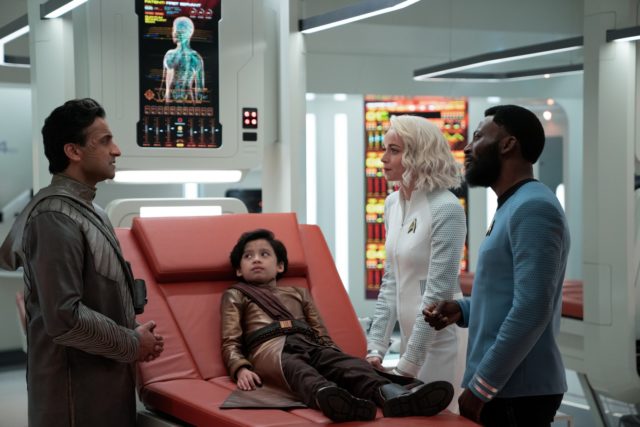
Huse Madhavji as Elder Gamal, Ian Ho as the First Servant, Jess Bush as Nurse Chapel, and Babs Olusanmokun as M’Benga
“We honor his sacrifice.”
The Enterprise jumps into action, grabbing the kidnap cruiser in a tractor beam, but the ship is so determined to escape that it tries to go to warp and explodes, stunning everyone. Alora is understandably upset, but Pike doesn’t understand when she says the loss of the First Servant will doom Majalis to “fall out of the sky.” If this kid was some kind of holy symbolic figure, how does the fate of the planet rely on him? Finally, Pike starts to ask questions. He gets his first answer from Uhura, who sorts out that Gamal was behind the abduction. He’s thrown in the brig. Spock also has good news, using kid genius’ personal subspace frequency to find the little guy hidden in a cargo container, beamed there instead of to that ill-fated ship. The First Servant is ready to go home to meet his destiny. “Majalis needs me.” Adorable. Alora is so happy she invites Chris to the special ascension ceremony, but he isn’t getting any answers from her about all the little things that are starting to not add up.
Number One gets her chance to play bad cop with Gamal, who admits to trying to keep his son from the ceremony, and says he wants to save him… from what? Pike is invited into the “sacred chamber” as his crew futilely tries to contact him. The throne room is more high-tech torture chamber than regal as the First Servant (mostly willingly, until the last minute) is locked into a chair just vacated by a little desiccated corpse. The other shoe finally drops: All the talk of “sacrifice” is literal. Defying the newly-minted Prime Directive, Pike tries to stop it but gets knocked out as the First Servant is plugged in. In her bedroom, Alora tells a revived Chris the tech behind the floating utopia requires the mind of a child—and there is no other option. She doesn’t understand his horror, using relative society morals and his own cultural history as an example. She also still wants him to stay. Needless to say, he doesn’t feel the same way and returns to the ship to ponder his fate over a stiff drink. One silver lining: Before leaving for Prospect VII in the hopes of saving the next kid fated for Majalis’ macabre machine, Gamal gives M’Benga some medical tips that may help his daughter.
ANALYSIS
Facing your fate
“Lift Us Where Suffering Cannot Reach” lives up to its grandiose title with a thought-provoking episode that feels like classic Star Trek and even classic sci-fi. Stepping back from any reliance on known elements of Trek lore, the series fulfills its mission to bring us a new world, one that got stranger and stranger along the way. In addition to picking up on the recurring theme of fate, especially through the character of Pike, the well-paced episode also explored questions about what is required for some in a society to benefit and the heavy price that gets paid. Mixed in with a little action and some romance, the episode has a somewhat dark tone, with parallels to contemporary issues including poverty, income inequality, and third-world exploitation; the Strange New Worlds writers use a soft touch instead of the hammer that is too often deployed.
The heavy lifting is ably handled by Anson Mount as he takes Pike through quite a journey from rekindling an old flame to confronting his fate to facing some reluctant truths, and Lindy Booth does a great job as his dance partner along that journey. The main plot was nicely woven into Pike’s arc of coming to grips with his fate, with an interesting parallel with the First Servant as Pike is also sticking with his Starfleet duty, knowing that he, too, must eventually sacrifice himself. Even though he was the last one to catch on to there being something fishy about Alora and Majalis, Pike’s motivations and actions all seemed reasonable, and of course, he was the Captain Pike we needed when the moment required it. And that included his willingness to go against the Prime Directive to do what he thought was right.
The La’an/Uhura side mission offered some fun moments to lighten things up a bit, with nice work and chemistry from Christina Chong and Celia Rose Gooding. While the M’Benga storyline about his daughter was more organic than when it was introduced in episode three, it still feels a bit like a distraction and even a bit emotionally manipulative, although the scene with the kids playing hopscotch with noble gasses was admittedly cute… until the sick girl had to be stored away, again. Also, the show still seems to be struggling with how to use Rebecca Romijn’s Number One, who seemed to be immediately skeptical of the visitors, but then disappeared (again) for most of the episode.
A classic story
Perhaps the best thing about this episode is the familiar feeling it evokes and how well it fits into the tone and themes of Star Trek. While an entirely new story, there were plenty of classic elements including the good guy/bad guy reversal, the aliens with a hidden secret, and of course the returning old flame with some new issues. The plot and themes fit well with Star Trek episodes like TOS’ “The Cloud Minders,” TNG’s “Conundrum,” Enterprise’s “Dead Stop,” and the feature film Star Trek: Insurrection. For Strange New Worlds, the alien utopia felt both real and magical, thanks to excellent production design and costumes.
But beyond Trek, this episode has deeper roots in sci-fi, clearly informed by Ursula K. Le Guin’s 1973 short story “The Ones Who Walk Away from Omelas.” While the third season of Discovery was tangentially inspired by this Hugo Award-winning tale, this was almost a beat-for-beat recreation in a more high-tech alien setting. Le Guin’s thought experiment about a society that keeps one child in squalor for the rest to flourish remains just as powerful today, and the writers were smart to keep the details vague, avoiding the encroachment of traditional Star Trek tech fixes to what is really a moral dilemma. And like the short story, the morality isn’t cut-and-dried, as noted by Alora: In their society they acknowledge some have to suffer, and “the only difference is we don’t look away.”
Final thoughts
Another strong episode from Strange New Worlds, and importantly, one that continues to show how the series is embracing different styles and tones.
Random bits
- This is the second Strange New Worlds writing credit for co-producer Robin Wasserman, who co-wrote the previous episode, and the second credit for supervising producer Bill Wolkoff, who co-wrote episode 3.
- This is the second Star Trek credit for director Andi Armaganian, who previously directed an episode for the fourth season of Discovery.
- Stardate 1943.7.
- Once again, Bruce Horak’s Hemmer does not appear, yet Dan Jeannotte’s Sam Kirk showed up again.
- Lindy Booth (Alora) starred along with Rebecca Romijn in The Librarians.
- The First Servant made a hopscotch game using noble gasses and the different colors correspond to the discharge colors of the six different gasses (as seen in neon lights).
- The Majalis location was shot at the Parkwood National Historic Site in Oshawa, Ontario.
- Pike does a decent impression of La’an.
- Prospect VII was Class L, helping sell that it was hostile environment unlike the idyllic Majalis.
- La’an’s Lessons of Security include:
- A Rigellian tiger pounces with no warning.
- There are no breaks in security because threats never take breaks.
- Let your Tricorder do the investigating.
- unknown
- unknown
- Know when to bend the rules.
- Leave no stone unturned.
- Pike warned Uhura to “keep an eye out” for lesson 7 and La’an revealed she usually requires people to “look under Mugatan breathing stones,” possibly something to do with the Mugato horned apes.
- La’an warned about Klingons booby-trapping abandoned ships, possibly indicating she is a veteran of the Federation/Klingon War. Pike and the Enterprise were on a deep space mission and missed the war during the first season of Discovery, but La’an was not part of the crew during that period.
More to come
Every Friday, the TrekMovie.com All Access Star Trek Podcast covers the latest news in the Star Trek Universe and discusses the latest episode. The podcast is available on Apple Podcasts, Spotify, Pocket Casts, Stitcher and is part of the TrekMovie Podcast Network.
New episodes of Star Trek: Strange New Worlds debut on Thursdays exclusively on Paramount+ in the U.S., Latin America, Australia and the Nordics. The series airs on Bell Media’s CTV Sci-Fi Channel and streams on Crave in Canada. In New Zealand, it is available on TVNZ, and in India on Voot Select. Strange New Worlds will arrive via Paramount+ in select countries in Europe when the service launches later this year, starting with the UK and Ireland in June.

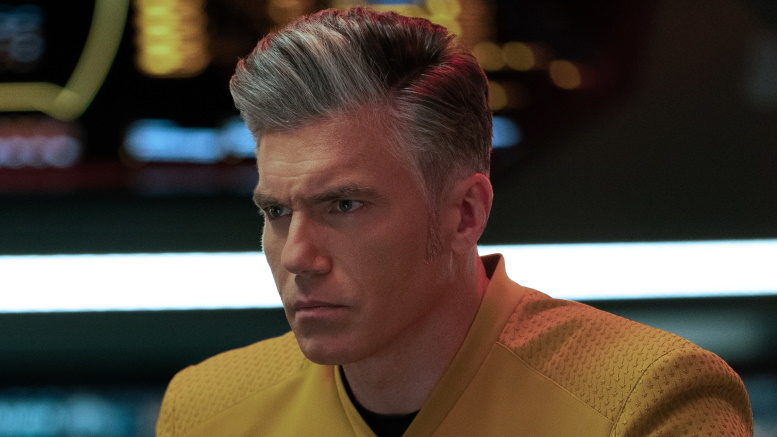
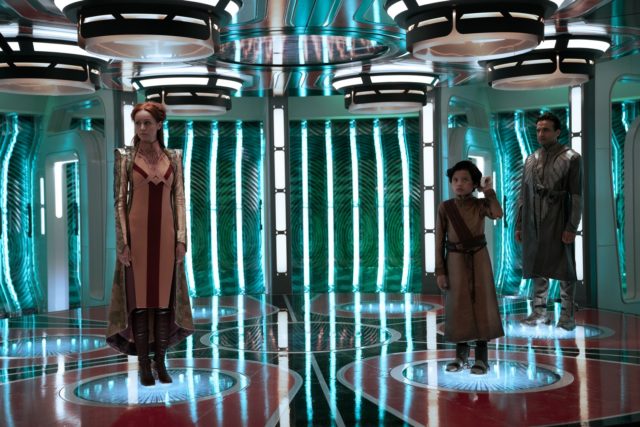

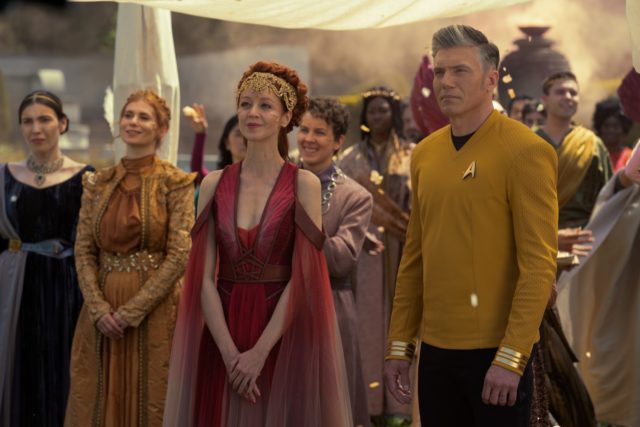
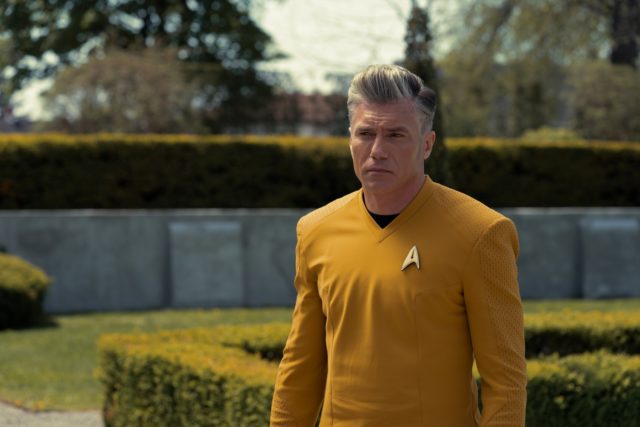
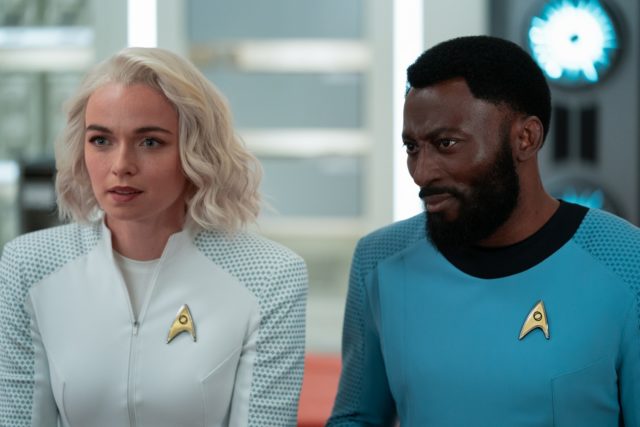
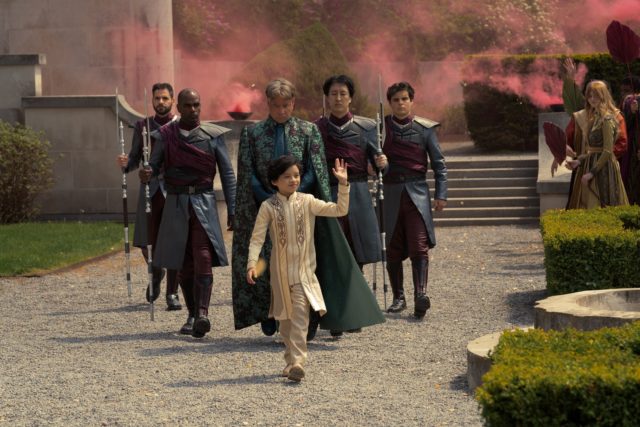
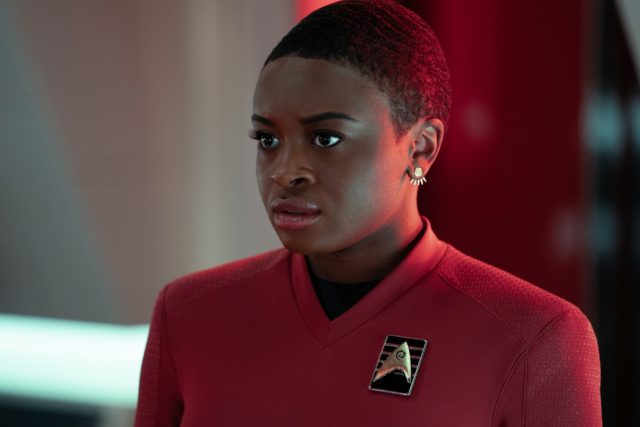
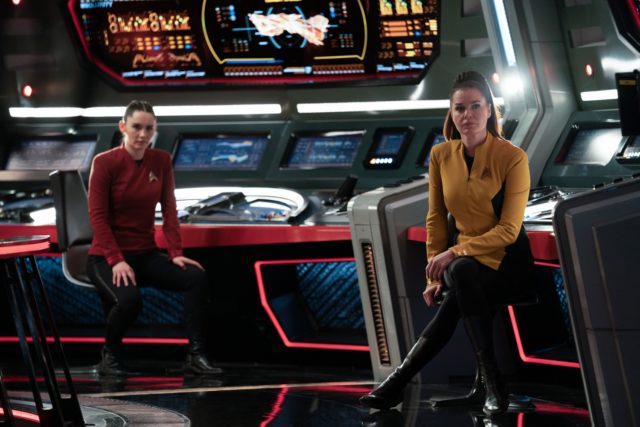

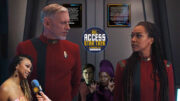
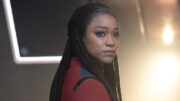
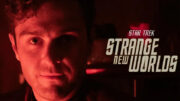
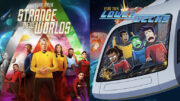
The point of Star Trek is to be able to look someone in the face when they say —
“Can you honestly say that no child suffers for the benefit of your Federation? That no child lives in poverty or squalor while those who enjoy abundance look away?”
and respond with an emphatic, “YES.” The formula is pretty clear: Kirk or Picard or Sisko or Janeway would say, “We were once like you, finding safety in our traditions, recognizing the cost but never asking ourselves if we could actually live with it,” etc. At least RESPOND to the horror instead of swallowing it up. Two dead kids in this episode and his only response was to grimly stare out the window after saying, “I’m going to speak to my manager. Somebody should do something about this.”
And while the episode says child abuse is bad on the one hand, it continues to insist that M’Benga’s child abuse is Actually Good.
Still not the worst of the season, but pretty clear that the people making these new shows are pretty cynical and unimaginative. They can’t possibly imagine a better future or imagine better people trying to deal with terrible things. I guess if Pike can’t put together a video clip package to prove his point he’s content with sitting this one out. So much for trying to change the future. He seems resigned to his and everyone else’s fate. What a leader. What an inspiration.
P.S. He’s really undermining the power of what happened to him in Discovery. If he chooses to accept his fate for the greater good, it’s surprising here to see it as the only thing he can talk about in Strange New Worlds.
I liked the episode more than you but yes the ending left a sour taste for me too. You said this perfectly: “Kirk or Picard or Sisko or Janeway would say, “We were once like you, finding safety in our traditions, recognizing the cost but never asking ourselves if we could actually live with it,” etc. At least RESPOND to the horror instead of swallowing it up.”
My disappointment in the conclusion stems from the fact that the boy didn’t seem at all bothered by dying. Would have been much more powerful had he been protesting the whole time.
It seemed to me he was completely accepting of his fate. He did show some trepidation when he saw the corpse. It shook him as it should but ultimately he did was he realized he had to do. I was pleased they actually went through with it. Makes for much better drama. It would have been too gimmicky to have the boy saved and the crew finds an alternative.
I’m wondering what the other episode this writer was involved with. Was it Children of the Comet?
Yeah me too! Episode wasn’t perfect but I think people have to remember this is something they have been doing at the beginning of their society. Kids are born and told this is why they were born, to keep everything they know prospering. They feel it’s not just a duty but an honor. Obviously I disagree with it, but that’s the point, we’re not suppose to be happy about it, but we do have to accept it just the same.
There was a similar episode in Stargate: SG-1. I can’t remember the title but they came across an alien society descended from Aztecs or Mayans with super smart children. They then discover that the kids have nanites which allow them to learn faster but that once they reach a certain age the adults harvest the nanites so the rest of their society can access the information picked up by the kids. Unfortunately this leaves the children essentially as vegetables.
You need to research cult psychology then, my friend. His behavior was exactly as what I would expect in a cult, or from many ancient races on Earth as well.
I’ll agree that it fell short of its ambitions, but DS9 was the first show to strongly tell us that Earth was not quite the utopia that the likes of Kirk and Picard always insisted.
Plenty of analysis from Trekkies online that explores deeper, but from the Maquis to Tom Paris, and beyond, it’s clear the Federation — and Earth — are not truly as perfect as they have always claimed.
Sounds to me like you’re the unimaginative one.
That’s an absurd read of DS9’s implication. It’s thesis is that people aren’t perfect and it contemplates Earth itself as a corruptible paradise, but in the gritty details, “Poverty, disease, wars — they’ll all be gone within the next fifty years” is a Troi line in Star Trek: First Contact, co-written by Ron Moore who was a big believer in the “The Federation Is Not So Perfect” idea you’re mentioning here. And the lack of imagination I’m calling them out for and which you’re choosing to misinterpret is their portrayal of a Federation character in the face of an injustice.
“The Federation isn’t perfect therefore children in the Federation live in squalor and it’s an acceptable comparative justification this character is making” is a tremendous leap, and all I’m saying is that it’d be nice if a show labeled Star Trek actually cranked out some Star Trek concepts from time to time.
Well, sheesh. Poverty and deprivation, while eradicated on earth, are not yet unknown on earth colonies within the Federation. Episodes of TOS, TNG, and DS9 made that clear, sorry.
And while much of its appeal is indeed inspirational/aspirational, Trek is generally not at its best when it features a captain pointing his finger at some aliens while stating “we’re so much better than you.” This franchise is still largely an American/Western one, speaking to Western audiences, and making smug speeches about our moral superiority is not how we learn anything about ourselves.
What did we learn about ourselves in this one that we don’t already know from turning on the news? We’ll sacrifice our kids because it’s what our Founders wanted is an idea that gets reaffirmed every school shooting. We can’t even have a Star Trek captain be like, “Hey folks, it gets better. You just gotta want there to be another way.”? That’s considered finger pointing?
Also, everyone loved the first episode of the show and its ending is Pike lecturing a populace. I’m only saying here that Pike spent more time talking to the woman he slept with about his vision of his own death than saying she’s wrong about Earth — not every planet lands on the same thinking as theirs did. Another way is possible, you just have to want there to be. Then she could say, “This is what we want. What I want.” And that’s that. But Pike just getting all slumpy-shouldered sucked.
I’m not even saying the episode needs to be different (for instance, that scene where he comes to and says he’s gonna rescue the kid could’ve cut right back to the chamber with Spock and M’Benga with Pike after they did “somehow” break in and they confirm her report that they can’t detach the kid without killing him), I’m just saying that they missed a very obvious moment IN A STAR TREK SHOW to do what a Star Trek show is supposed to do. And it tells me a lot about PIke (not Anson Mount): he sucks.
The logic of your opening paragraph makes zero sense and requires some absolutely crazy presumptions. And a lot of people weren’t pleased with the opening episode. Saying “everyone” is hyperbole.
The only thing about Pike here that I find a bit flawed was that while he was right to be angered about using a child to keep the world spinning, as it were, he should also realize he was pretty powerless to do anything about it. Instead of fighting the guards he should have tried pleading to their humanity and that they can find another way. Apart from that the episode was pretty decent Trek.
I think it’s a pretty decent episode of Trek, too. I’m just astonished that they dramatically wrote Pike into a corner in terms of what actions he could do and then just let him beam quietly into that good night. He spent the entire episode either wining about his fate or being two steps behind the antagonists and the audience about what was really going on — but, maybe they didn’t want Pike to end two consecutive episodes giving a speech, even if in this case, it wouldn’t have mattered at all, which could’ve been a nice contrast from last week. It’s just a real bummer they wrote that Federation kids line in there and let it go unchallenged by the lead of the show.
I kinda like that he was cornered. And I liked that they moved on not being able to do anything about what we think is a horrid situation. And I also had no real issues with the Federation children line. Earth is said to be a paradise in DS9 but there aren’t as fun places elsewhere in the Federation, I should think.
Well isn’t that “Folks, it gets better, you just want there to be another way” pretty much what Pike said in the pilot? Or are you just bound and determined to find fault with every single creative choice made on this show, period?
As for what “we already knew” by turning on the news — well, precisely. What did we ever learn about political issues in any Trek episode, or science fiction novel, or fantasy novel, that we didn’t already know by turning on the news? What could we learn about the fall of empires from reading the Foundation Trilogy that we could get first hand from Edward Gibbon? The point is to hopefully look at these issues in a fresh way using the funhouse mirror of fantasy as metaphor, to see the world in a way that we hadn’t before. I totally agree with your assessment that this willingness to sacrifice the life of a child for the sake of what was perceived to be the greater good tracks pretty closely with the priorities of Second Amendment absolutists (or ideologues of all stripes and persuasions, really, who value their pet theories more than they do actual people). But that is the idea: to get people to think, and, possibly, start a conversation.
I believe you’ve confused my general criticism of the beat in this episode with somebody else’s dislike of that speech element in the pilot. I think if he’s going to do it in the pilot it makes perfect sense for him to do something similar in this episode especially since he has a personal connection to the person making the dispassionate, academic argument in this moment that’s not the slam dunk rebuttal to his outrage in universe as the writers here in the real world want it to be.
I try to reserve my criticisms for the egregious stuff that causes my eyes to bug out while I’m watching the show. I just don’t get what they’re doing with Pike. He’s a sh***y character, and Mount’s using every last molecule of charm and acting ability to make him come off the opposite of that.
There is a stark difference in the first episode and this one though. It’s easy to tell people not to destroy their society but it gets more complicated when their society relies on sacrifice to maintain it. Of course everyone is on Pike’s side, but that’s because A. As most Starfleet Captains he’s speaking as the audience and B. It’s usually easy to be on that side of the argument when we don’t live in that society and has to face any of the consequences those decisions have in the long term.
That’s always been the issue with Star Trek. Kirk and Spock will beam down to a planet, see something they think is morally reprehensible and after being there maybe a few hours decide to change a situation that may have been happening for hundreds if not thousands of years. Now, it’s a TV show so at the end it usually tell us ultimately what Kirk did was right and its going to work out. But we never know what the long term effects are because Enterprise just warps out to the next planet and everyone has to now deal with the fallout. Maybe it works out just as Kirk says. Or maybe it makes things worse.
Pike is morally on the right side, but we don’t know if his actions would’ve been on the best side either because we know so little about this society or how it functions. Yeah sacrificing a kid every few years looks and feels repugnant. But what if sacrificing one every few years save thousands or even millions in the process? Then what? It’s easy for Pike to have the high ground because he’s not going to be there to deal with the repercussions of his actions. They will be the ones who has to deal with it. I’m not saying that’s what would happen but we just don’t know either way.
I’m not even suggesting that he DO anything different, but his silence in that moment was deafening, if for no other reason than this wasn’t really a policy debate — he had a personal connection with Alora and in that moment she was trying to say, “Because your people suck mine can suck, too” and he basically conceded the point. It was dumb. And since I have to swallow any objections I have to this show where it comes to canon — I guess including the entire premise of Star Trek now — I can only say that Pike meekly backing down made him a weak character. So my criticism would still stand Trek part of it. You would think a character who knows exactly when and how he was going to die would take more personal risks, either in what he did or what he said.
OK that’s a fair point and I agree. It is odd he didn’t at least try to argue the point. He basically acted like she had the point and his silence was agreeing with her. I don’t know if it ‘bothers’ me but yeah I do wish he said something back.
It is odd because it look like they were setting that scene up for Pike to give the ‘We were once like you’ speech every Captain gives as you said. But it didn’t happen.
I tend to agree with this. The Federation smugness you describe to me permeated TNG when they came across societies our society would frown on. Even when they said that we have to let them do it because it’s their world came across with a ‘we are much better than you’ attitude.
Actually, it was often even worse on TOS. One of the worst offenders was “The Apple,” where the Godzilla rock-head computer Vaal keeps its humanoid slaves in a state of blissful and well-fed stagnation, until Kirk kills it and makes a speech about the joys of freedom. I’d bet that many of the natives were dead of starvation or disease within weeks of the Enterprise’s triumphant departure, but out of sight, out of mind.
SNW has a long way to go to displace TOS, but this episode is so superior to “The Apple” that they hardly belong in the same fictional universe. Pike may have loathed what he saw being done to a child, but at the end of the day probably understood that those cities falling out of the sky would not be a preferable outcome. And that, as self-serving as it was, Alora’s question about who was willing to look away and who wasn’t was a fair point.
I think this episode was about on par with The Apple. Apart from that opinion we are in agreement on the 2nd paragraph.
I disagree that TOS was worse. Never on TOS did I feel the subtext of “we are superior to you inferior weird alien culture”. The Apple did not produce that feeling. They actually had a bit of a discussion about if this situation was acceptable. Spock taking one side and making good points and McCoy on the other making equally good points. Kirk felt the society needed to evolve (a very debatable choice that I think was wrong in this case) but never was there ever an undercurrent of “we are better than you”.
Well, we’re light-years apart on “The Apple,” sorry. (And the writing staff hated it , too — the only reason the thing wound up getting made was because of the sunk costs.) Aside from it being a pretty cheesy retelling of “The Return of the Archons” (and that isn’t a favorite of mine, either), the dialogue, settings, and makeup are all just stupendously silly. I will grant that there are a few minutes of interest that allow Spock to make an opposing argument, but the Script God clearly sides with McCoy and Kirk, who ultimately deflect by making the vaguely racist observation that if anyone looks like the Devil, it’s Spock.
Wow… The playful dialog at the end was just that. Playful. It wasn’t “racist” by any means. I’ve joked with friends about how they look and I’ve gotten it right back. Friends do that sort of thing.
And for the record, regardless of who on staff liked it or not, there were a LOT of worse episodes out there. A lot. And the episode did have some things going for it. I thought the alien make up was one of the better ones considering what we have seen on that show, too.
The idea that no poverty exists in Star Trek is fanon–it’s something fans have worked into their interpretations but which has never been said. It’s incredibly unrealistic to think that would EVER happen.
===from Star Trek: First Contact===
GEORDI
Your theories on warp drive allow fleets of starships to be built and mankind to start exploring the Galaxy.
TROI
It unites humanity in a way no one ever thought possible. When they realize they’re not alone in the universe, poverty, disease, war – they’ll all be gone within the next fifty years.
===from “Time’s Arrow, Part II“====
TROI
Poverty was eliminated on Earth a long time ago. And a lot of other things disappeared with it – hopelessness, despair, cruelty…
MARK TWAIN
Young lady, I come from a time when men achieve power and wealth by standing on the backs of the poor, where prejudice and intolerance are commonplace and power is an end unto itself. And you’re telling me that isn’t how it is anymore?
TROI
That’s right.
===from “The MaQuis, Part One”===
SISKO
Just because a group of people belong to the Federation that does not mean that they are saints. The trouble is Earth. On Earth, there is no poverty, no crime, no war. You look out the window of Starfleet headquarters and you see paradise. Well, it’s easy to be a saint in paradise, but the MaQuis do not live in paradise.
Exactly. Earth is a paradise. Not the Federation, or at least not all of it. So Alora’s point stands.
That was how I took the Sisko line from DS9, too. Earth was considered a paradise but there are some pretty awful places in the Federation.
PICARD
The message I received…
(beat)
My brother… and his son — my
nephew — burned to death in a
fire.
Some paradise! Picard’s brother couldn’t even bother to install modern fire suppression equipment in their old home, so Picard’s little nephew died unnecessarily.
Plus there was that pesky Kansas twister that took out Olivia D’abo’s folks.
Couldn’t disagree more. I thought this episode was excellent, classic Trek. I can nitpick along with the best of them, but not this episode. No complaints.
Phil, I could not agree more with you on this one. This ep illustrated the best that Star Trek can do in terms of moral quandaries. Loved it!
Yeah, that’s a lot of nonsense. There’s no need for one of those self-flattering speeches ever again.
This season of SNW is happening after the Klingon War is over. I think it would be naïve of Pike to say that every planet in the Federation isn’t suffering anymore. Also, what he’d just witnessed was HORRIFYING. He tried to save this boy and ultimately failed. His comment about him “informing Starfleet” is his duty. There are reports to write. Also, the night before, he was sleeping with a long lost love, only to watch her sacrifice a child the next day? That he had just delivered back to the society? He was floored. He had to be disgusted with himself, as well. After returning the boy to the planet, he thought he was doing a good thing and then failed to save the boy, from his own newly discovered mistake. I think the writers were trying to hold a mirror to many issues for the viewer to interpret. Abortion, child labor/slavery, greed just to start. Anson Mount’s performance was just about perfect for me. Disbelief and disgust at Alora and Majalan society, disgust at himself. He goes from shock, disbelief, horror and disgust that slowly builds until he beams up. Anson Mount wanted Pike to have flaws. That shot of him looking out at that planet from his quarters, then ultimately reaching for a drink? Perfect.
Excuse me, but didn’t Picard’s little nephew burn in a Picard family house fire because they were unwilling to install modern fire prevention technology to protect the family? Yea, and that happened in TNG era of the Federation to, many years after the SNW era.
So I am calling BS on your comment, no offense meant.
Perhaps Pike could have responded with a self-righteous retort that “we were once like you, etc.” but his response would have been a flat out lie.
The Federation is not perfect, never has been, and some of the best Star Trek stories explore those imperfections. Sisko said it best when talking about the Maquis (in the aptly titled two-parter, “The Maquis”):
Replace the Maquis with any Federation colony that does not live in abundance and the point still stands.
I think the writers were making a good point here. The only problem is it doesn’t fit the fictional universe it’s in. If this story was set in our time then yes you could argue that the sacrifice of the First Servant is no worse that the suffering our society puts on some kids through war, 3rd world exploitation, income inequality, etc. But the problem is that the Federation is supposed to have solved most of those problems by the 23rd century. The Federation has it’s problems, but as far as we’ve seen so far nobody goes hungry or is exploited for labor.
The story was interesting and i liked seeing Lindy Booth in the episode i liked her in The Librarians.
I felt sorry for the kid and how his people were using not only him but used other children for their
neural network to continue their ‘paradise’ and i do hope the Majalan doctor Gamal can help M’Benga cure his daughter. The scenes with La’an and Uhura were interesting.
Not much else to say about this episode to be honest and i find this weeks episode was good but i find it to be the weakest of the season.
So far i am enjoying S1 of SNW but imo it’s no where near the best of Trek. Out of the new Trek shows SNW is my 5th favorite new Trek show with Discovery at 1st, Prodigy 2nd, Picard 3rd and Lower Decks at 4th.
There is no denying that SNW is a damn fine Trek show and has the potential to be one of the greats.
Imo it just needs the writers to loosen up and allow the show to grow to that potential and hopefully they will.
It’s at least as good as VOY and ENT, and in my opinion far better than both. Even a mediocre episode like this one ranks better than your average episode of those two shows.
It doesn’t yet reach the heights of DS9, but comes awfully close to mid-series TNG.
Enterprise and Voyager aren’t even in the same class as SNW. That’s like comparing Spam and Scrapple to Steak.
I agree. SNW is far and away the best nu-Trek, and it’s starting to compete with the old. So, yes, I’d say already (in its 1st season!) on par with VOY and ENT. I had the highest hopes for PIC and didn’t mind S1, and DSC got to boring non-hate level in S4, but both those shows are oodles below par (with parts unwatchable and actively damaging to the franchise). I’d rather watch TNG S1 than either DSC or PIC S2. I like LD and Prodigy for what they are, but they are by design not core Trek. I am not sure where OP rates old trek in their ratings.
This episode felt like a complete reincarnation of TOS for the 21st century. It is a classic Trek episode. As noted, it is essentially an adaptation of a classic Ursula Le Guin story. It would be nice if SNW took a stab at hiring science fiction writers to create occasional episodes (or more than occasional), and use that TOS approach to finding some more classic tales.
My takeaway from Strange New Worlds thus far is that Star Trek works much better in an episodic framework than it does in the modern heavily serialized narrative format.
Totally. It had all the punch needed and was stronger for not being drawn out over a season (which actually means the final episode being rushed.)
While for me it was the weakest of the six, i do agree it felt the most like a TOS episode. And I still liked it. It’s high praise when a “disappointing” episode is still good, and eminently rewatchable.
It this were a TNG episode I think it would have ended with Picard making a speech about the value of every life and Geordi and Data coming up with a workable solution. The planet goes for it. Everyone happy.
I think this version was better.
That’s not necessarily true, as evidenced by “Half A Life” and “The Outcast,” for starters.
Yeah… I don’t recall the bulk of the TNG titles. So I have no idea what those episodes are.
Either way, it just proved your argument wrong. Like every show, every situation is different depending on the episode. Most of the time they find a way to win out, but not every time either…like in the real world.
No, my point is still valid because I did not provide specifics. I said “if” and then followed the most likely outcome based on what I recall from the episodes.
Fine, but it was proven wrong.
A contradictory comment. If you say “fine” to my comment it suggests what I said had at least some validity. Meaning it wasn’t proved wrong. Citing two episodes out of scores that dealt with similar situations doesn’t prove me wrong as my comment never made it an absolute. More of a trend.
Dude I just don’t want more silly arguments OK? Cool.
I never made one. My point is still a valid one.
”Half of Life” – Timicin, a scientist and a love interest of Lwaxana, must return to his home planet to die when reaches middle age. Michelle Forbes play his daughter. he ends up going to die. “The Outcast”- Riker gets involved with a scientist from a gender-less planet, who eventually identifies as female. Eventually the scientist undergoes a treatment (ala conversion therapy) and no longer identifies as female.
Now I recall them.
The Half Life episode is similar but the other I’m not seeing a connection. But even if it did, again, two examples of many doesn’t discredit my point.
There’s also “The Perfect Mate,” in which Picard acquiesced to human trafficking in a somewhat similar situation.
Totally agree. They could have done the usual stirring speech and last-minute techno-fix, which as a Trek fan I certainly love, but it was more interesting and more emotionally resonant that they did something different this time.
Yeah I agree as well. It was just a much more realistic and somber ending which we know doesn’t happen in Star Trek very often. And that’s why the Prime Directive is there. Sure you can over step it like Kirk and others have done on more than one occasion but if they followed it to the letter every time, most of those episodes would end pretty badly.
“The Ones Who Walk Away From Omelas” by Ursula K. Le Guin, winner of the 1974 Hugo Award for Best Short Story.
A serious, yet solid new story about a strange new world. This is what I was hoping for with this series. Keep it up SNW.
Very good. And aware of SF, not a cop drama, romance or other merely set in the future.
This is factually incorrect:
She very clearly speaks in present tense, referring to children presently in the Federation.
Again not the most original of stories but done with enough of a twist to keep it fresh and the characters make it work. Just goes to show, what a good ensemble can do to any script.
Also, they created a pretty interesting civilisation here, that has a lot of room to be revisited later. That’s always a nice touch.
I however still feel they overdo it with the music in scenes that are basically just dialogue. That is getting kind of annoying.
Also the metaphor kind of fell apart at the end, when Booths character lectures Pike how the riches and ease of living of the federation come at the expense of children being mistreated somewhere out of sight. I get, that they’re trying to hammer home the capitalism-is-bad-angle but it really doesn’t work here, since the point of the federation, the whole point of Star Trek as a Franchise ist, that this is exactly not the case. But you can probably read it as her trying to deflect the criticism 🤔
And why did Pike mention to the guard, that his phaser was set to kill; or: why was his phaser set to kill in the first place.
Edit: It also was nice, that they finally managed to go tonally dark in a modern Trek show instead of resorting to gore. If this was a Discovery or Picard Episode, they would have probably shown the child shredderd or something 😁 — it’s nice to finally see some restraint
I didn’t see it as a “capitalism is bad” sort of thing. It was more like reminding Pike that to her his society does has the same thing and probably at a larger scale for no societal benefit. Therefore her way was superior. Not saying I agree… Just that I do understand the argument.
I’m guessing that M’Benga eventually returns to this world illegally and obtains its medical technology to cure his daughter, and possibly Captain Pike ten years down the road, and that’s why he’s longer CMO by Kirk’s time.
Could be. I was thinking it was his secret personal use of the medical transporter. It will eventually get out that his abuse of his authority potentially cost many lives and he will get demoted for it.
More a parable than a short story, “The Ones Who Walk Away From Omelas” is one of the most insightful pieces of prose ever written about who “deserves” happiness, and who doesn’t. It can be read for free online, and I cannot recommend it enough.
Thanks for that, Michael. Found the .pdf online and printed it for later. Cheers.
Hope you enjoy. It’s beautiful prose — that’s typical of Le Guin — and with any luck you’ll be a slightly different person after you read it than you were before.
I liked this episode. It reminded me of TOS up until the end. The end part of the episode, I kept thinking how if it were Kirk instead of Pike, Kirk would most likely have violated the prime directive and monologued the people to distraction, saved the child and forced the alien civilization to change no matter how much damage it caused.
Still loving this show. The best Trek since the Berman era.
Funny… It reminded me more of a TNG episode than TOS.
This was a decent episode. It was pretty Star Trekky and there were not retcons or ignoring of something TOS did. This is the sort of thing I was expecting more of from this series.
Let’s hope the final four episodes are all like this. But if I were a betting man I would bet against it.
Such cynicism …. we must be distant relatives :)
Like you I thought the episode was decent. I did kind of see the twist with the kid telegraphed and was a little surprised by Pike’s inaction at the end. I think back to TOS shows like A Taste of Armageddon and The Apple where Kirk throws the Prime Directive in the trashcan and really shakes up the status quo and the resolution here felt a bit impotent. But it also is in keeping with more modern TV sensibilities of not ending on a happy note or finding a neat and tidy conclusion by the end of the show.
I did find the pacing of the episode on the slow side. It just kind of meanders around until the final act and then drops the big twist which by then isn’t much of a surprise anymore. My bigger issue, as has been the case with every episode so far, is that while it’s ok and holds my attention, it’s not something that I have any desire to watch again. It’s leagues better than Discovery or Picard but but quite frankly that’s not a very high bar. Nothing presented in SNW has stayed with me after the episode has ended and it all feels kind of lightweight at this point.
The story structure of all the episodes has also been pretty much the same with an A story that presents the main plot and a B story which has one of the junior officers interacting with one of the senior officers that they expect to be unpleasant but end up proving their worth by the end (Uhura & Spock, Uhura & Hemer, Chapel & Spock/T’Pring, Uhura & La’an).
I’ll be curious to see if they get more ambitious for the final 4 episodes.
If one ignores the irritating major canonical transgressions I agree. The show overall is decent and still lightyears better that Star Trek Discovery, obviously. But yeah, the rewatch value here is currently slim to none. The moment the ceremony was called an “ascension” I think it was kinda obvious the kid was going to die. The only question was would Pike stop it, convince them to stop it or be forced to allow it to happen? From a dramatic standpoint they made the right choice.
Regarding Kirk’s PD transgressions… A Taste of Armageddon was a big one. Although one could argue that since the society knew of extra-terrestrial life and was sufficiently advanced ignoring their war rules one could argue was not a true violation. Kirk was willing to take the hit himself but was not willing to allow his crew to perish. When the planet rulers didn’t go for it was when he interfered. The Apple was indeed a blatant PD violation. It was one of the rare times when he took McCoy’s emotional side over Spock’s logic, too. But I’m thinking they don’t want Pike to be Kirk-like. As a viewer I’d rather not him be like that either. So Pike does nothing here while I suspect Kirk might have put up a bigger fight.
This episode was such an allegory of how creative youthful genius gets twisted in the service of the mundane. For me it was like saying ‘imagine if Wesley Crusher instead of finding out his destiny got hooked up to power the warp drive which left him in grotesque pain’, clearly horrifying. But what was even more horrifying was the reaction of the citizens to the ‘sacrifice’. No one, except the boy’s father, among the Majalus elite cared except in a very perfunctory way for the boy. Here was a young man who had the genius of a Mozart and his life would not be to create new knowledge and art but to be a central unit for a neural network. The elite was not even bothered to try and find a new solution that did not consume children. The saddest part is that this society will never move forward,in spite of their formidable technology.
I will be thinking of this episode for a long long time.
This was a really well-constructed story. For one, we get a moral quagmire that isn’t at all clean. Pike is right, and so is Alora. Obviously, one could argue “Why don’t the Majalans move to another planet?” But that’s missing the point of the story. We see it throughout out world, wars over small tracts of land, people being displaced, tragic diasporas that rob people of their identity, etc. The stakes are fundamental for the Majalans. The First Servant’s sacrifice is also tragic, as Pike feels so strongly.
And this is the brilliance of the story- Pike makes a similar sacrifice in 10 years. He and the First Servant are in similar positions. Pike asks if the child will suffer, and that’s what he fears of his fate as well. Now, I honestly think Pike is clear-headed and true to his values in demanding to stop the ascension, but we are also the sum of our experiences, and this story really brings out what Pike is struggling with internally.
I also appreciate that the script doesn’t beat us over the head with those parallels. STAR TREK isn’t always subtle and secure in its storytelling, but this episode trusts its audience to think about it after the credits roll. Very quickly, SNW has grown up. Well done on all fronts- acting, writing, and direction. This is a great episode.
This episode was an emotional roller coaster, deeply profound, and deeply important. It’s a gut punch in the end, as it should be. “Lift Us Where Suffering Cannot Reach” is a quintessential morality play and allegory, and easily joins the ranks of one of the best Trek commentaries on society and morality. A lot of people will find this episode very controversial, and I’m certain it will be talked about for a very long time. Let’s go through it piece by piece:
The episode opens with Enterprise star charting on the edge of Federation space, with a voiceover, and it felt very very TNG. A small ship is being attacked, and Enterprise comes to the rescue. It turns out an old flame of Pike’s was on the ship, along with a boy and his father. It’s an absolute delight to see Pike completely smitten with this woman, and awkwardly stumbling over his words. Damn, Pike is so relatable lol. We’ve all been there, or at least I have!
Alora asks for help protecting the child, who is sacred to her people, as their First Servant. From the start, Alora is evasive about who attacked them and the exact role the child is to play. Uhura is getting training under La’an this episode, and plays a vital role, beginning on the crashed wreck of the attacking ship. They find a coin belonging to the royal guards, data chips, and a mysterious device. Alora suspects one of the guards, leading to a chase by Pike. Just before his accidental death, the guard calls this world “hell”. Just one of several clues pointing to something deeply wrong. However, Pike’s crush blinds him to these clues initially, sleeping with Alora. Hey, Kirk was just following the Pike tradition!
Meanwhile on the Enterprise, the First Servant plays with M’Benga’s child Rukiya, who is terminally ill. M’Benga’s face is heartbreaking throughout this episode, and the actor deserves a lot of credit. He asks Gamal for help curing her, and he initially refuses. Suddenly, another enemy cruiser appears and seemingly beams off Gamal and the First Servant. Upon hearing this, Alora is distraught, saying without the First Servant her whole world will die. Pike finally begins to sense something is deeply wrong here. It turns out Gamal and the child were hiding on Enterprise, apparently afraid of Alora.
Once found, Alora invites Pike to watch the First Servant’s ascension. Suspicious but willing to play along, Pike agrees. The child is feted by adoring, worshipping crowds before descending into the Ascension Chamber. It becomes apparent that he must be attached to some kind of machine. Alora leads the First Servant through the ritual, and the child’s innocence is heartbreaking. It isn’t until the last moments that Pike and the child see the consequences: the dead, twisted body of another child being removed from the machine. Pike and the child realize the awful truth too late: the First Servant is a child sacrifice to keep this civilization alive.
Pike doesn’t save the day. There is no happy ending here. The child is attached to the machine, and as Alora tells Pike later, the child will suffer greatly as he dies. Alora says her civilization’s founders designed the machine to only run on the painful deaths of children. There is no alternative. Her civilization accepts it. Glorifies it. It’s telling that Gamal, now condemned and exiled by this civilization, is the only one who tries to save both his child and M’Benga’s. Alora tries to justify it, saying that even in the Federation some children suffer.
But one civilization accepts and actively works to continue that suffering. The other works to prevent it. Those are the two paths facing America today. Do we continue to accept and block any attempt to save our children from mass shootings? From poverty? Or will we take the path of the Federation and make the choice to stop the sacrifice of our children to a misinterpretation of our civilization’s founders?
Who are we? Alora or Pike?
10/10
Excellent analysis and very timely too. I consider this episode to be among the best of Trek up there with the likes of “Duet” from DS9, another episode that is kind of underrated by many people but one of the absolute best of Trek.
Solid episode. I suspect it’ll eventually be on a ‘must see’ viewing list for Trek. Also pleased that it didn’t have a happy ending, or fall back on a technobabble solution.
Do you think that what makes SNW’s different and refreshing is that it is generally more positive than the more recent iterations? I kind of like that. As you say, not every episode has to “end happy”, but I hope they resist the urge to go all angsty and serious. I also like that this series is not a season-long exercise in episodic weekly misery, to be resolved in the last 10-minutes of the last episode. The Star Trek universe is supposed to be one of general health and well-being. Let’s keep it there, please. The next season of Discovery will give lots of opportunities to return to universe-ending crises.
Every episode has been pretty light hearted up until now. I really like they went bold and decided they couldn’t save the kid. This may be one of the darkest episodes of Trek ever lol but it actually works so well!
Don’t disagree, but I like that this iteration of Trek is lighter in tone and generally more positive. The tonal shift in this seemed abrupt to me but I certainly respect the opinions of all fans who disagree. I hope the positive direction will stay though. Recent Trek series as welcome as they are, have been work.
Oh yeah I love the lighter and simpler approach. It’s exactly why I like Lower Decks. Not every show needs to be about war or saving the galaxy. And we had enough of both after six seasons of Picard and Discovery.
And I think it was good to have an episode like this because I see a lot of posts in places that people say it’s playing things TOO safe and light. So it was nice to have one episode that went a bolder direction even if a little dark for some.
But you look at TOS and it really gives off a horror vibe tone a lot of time, especially in first season. People don’t look at it as ‘dark’ but it’s not a light show either. There are a lot of gruesome things in it. SNW is nowhere near that tone obviously. It’s more gentle in its approach and I don’t mind that at all. But I don’t have an issue if it goes dark from time to time but hope it stays on the lighter side overall.
Just to be contrary, this was my least favourite episode thus far. The action and visuals were great but it felt a little overstuffed story, character and plot-wise. The comments about what to do with Number one are spot-on. There isn’t enough room for two second-in commands. Maybe why she didn’t make it past the pilot in TOS? Spock in this iteration seems much more accomplished and seasoned – totally understandable given his Discovery experience – hence his equal-footing with Number One. He often speaks up during tense moments on the bridge when she should more likely be the Captain’s sounding board. The third-tier characters are getting much more exposure, screen-time and plot propelling moments than she is. Unless things change over the remaining episodes, I wouldn’t blame Ms. Romijn for reconsidering her commitment to this project. Finally, Pike literally broke all the rules of the Federation and Star Fleet to save the two warring cultures from self-annihilation in the first episode. It seems out of character for this iteration of Star Trek that he couldn’t think, talk or punch his way out of this one.
His options were limited though. It’s not a Federation planet. If he saved that one kid, they could just make another one and do it again later. Outside of trying to police the planet, there is nothing they could do if ultimately they wouldn’t want to stop. In the first episode, he convinced two sides from trying to destroy each other but I’m guessing for every oratory Captain that convinces a group of people to lay down their arms, another four wouldn’t listen and continue doing what they are doing.
The biggest irony being Earth itself. We have entire organizations whose job it is to stop wars, the United Nations is the biggest and nearly every country on the planet is a member…and yet we still have wars just the same, the Ukraine situation being the biggest in decades. Its easier said than done; especially when you are fighting centuries of conditioning.
As far as Una, I don’t see a huge problem there. She is a great first officer to me. Of course Spock is going to have answers a lot of the times, he’s the science officer. Data was usually the one that had most of the answers in TNG because he’s a walking computer.
And the character didn’t get passed The Cage because executives didn’t feel it was right to have Roddenberry’s girlfriend and mistress in such a prominent role on the show. It had very little to do witht he character herself.
The version I heard was they told GR to get rid of the woman as the 2nd in command and the devilish looking alien. The story goes he argued to getting rid of one and keeping the other. He opted to keep the alien.
I heard that one too, but I do think there is merit to not wanting his mistress on the show lol. That said, she was still on it playing Chapel, just in a smaller role so you got me.
This episode felt like ‘Dead Stop’ meets ‘Child’s Play’. The first being the Enterprise episode where the crew ran across that creepy automated space station and needed people’s brain power to run it and Child’s Play being the Voyager episode where Icheb’s parents created him just to be a weapon to take down the Borg.
Unlike those two, this one ended in a much more dire way. And I really liked that. It was sad obviously but it was one of those reminders that the Federation doesn’t police the galaxy. It can’t expect every society to follow its morals or that morals are not the same in every society no mater how pristine, advanced and civil it looks. And ironically it looks that way because of the sacrifice they have to give to run it.
I didn’t love this episode however and like many, I thought it was the weakest out of the bunch so far; but still solid. And another great Trek philosophical issue of wanting to do the ethical thing while your ethics tell you ultimately you can’t do anything. That dilemma doesn’t always happen but yes it has on pretty much every show at some point! And any time you make it a kid at the center of a conflict, you automatically raise the stakes.
This is what Star Trek is and one of the reasons I fell in love with it! Rating 7/10 which is crazy because this is the first episode that has fallen below an 8 so far. I’m really enjoying this show lol!
Yeah on many levels, this story did seem like classic science fiction and I agree, the non-happy ending, although dark and disturbing, made the episode more meaningful and thought-provoking.
Because the morality tale involves the death or sacrifice of a child, it is difficult to say oh this is a great enjoyable episode. That said, I think it was still very good and 7 is appropriate.
Btw besides the somewhat hopeful end where the Doc is given information which may one day help save his daughter, i also liked Cadet Uhura’s continued training. No wonder in the first scene of the very first aired TOS episode, The Man Trap – Lt Uhura is at the navigator position, with Sulu on helm and Spock in the Captain’s chair. In B of T, she also replaces Stiles while they fight the Romulans. She isn’t just a Comm Officer – and now we have her backstory!
You brought up the M’Benga story. I’m thinking that situation may very well be the reason for his later demotion. This transgression eventually gets out which explains him being on McCoy’s staff briefly rather than CMO.
Yeah good point and it makes a lot of sense. I know there are continuity issues, most of which I find dont dwell on or even care about, but I also appreciate when SNW does try to live with the confines of canon, and that sounds dutifully plausible to me.
I read an interview where one of the show runners said they purposely looked up episodes of the classic shows plot lines to copy but do their own twists on them. And that’s not a shock since every episode so far does feel a bit recycled from TOS, TNG or VOY shows. I think that’s what they did here too but the twist going much darker version because as others been saying the other Captains probably would’ve found a way to stop it. And when it comes to kids in danger, it’s never a concern they will die. In Pen Pals they broke the prime directive and saved a dying planet because Data became friends with the little girl. So we always know they will be rescued in some fashion. That’s why this one really hits home, it diverted expectations I don’t think we’ve ever seen before.
And I never thought about that with Uhura but you’re right we have seen her take over other posts before. So something in SNW that not just lines up with canon but explains it in a great way for a change! That’s pretty cool!
I like it when they find little things like that to line up with what we have seen on TOS. Only legacy fans will pick up on it and it doesn’t affect the story they are telling as it doesn’t require TOS knowledge to enjoy the current episode. And to their credit, they do do that from time to time. So as much as I will rag on them for ignorant things like the Gorn I am obliged to credit them for things like Uhura when they get it right.
BTW… If what you said about them looking up other shows to intentionally to those stories their way… I would honestly rather they come up with their own stories and if they end up being similar to something that came before, so be it. There are so many episodes out there it’s tough to NOT do something similar.
I don’t disagree but recycling old stories is not new right? People chastised the old regime having TNG burrow some of TOS old episodes like Naked Time directly and then started having other shows burrow from TNG lol.
And look at the movies, a lot of them is basically to redo TWOK and STID used some of that film directly in the end. So it’s just what has always been done. The question is how successful are you at doing it? At least with SNW it doesn’t look like they are picking a single episode and just throwing their own twist on it. It sounds like they pick a theme or a famous Trek trope like a virus story and watch several of those episodes and then come up with their own version of one. I think that’s what they are doing. That’s why the Gorn episode felt like a mixture of different episodes too.
So in the next few episodes, look out for Una being on trial for murder, a story where they travel to past Earth ten years after First Contact and one where Pike is kidnapped on some planet or hostile aliens take over the Enterprise.
Btw, I know it’s another franchise, but this episode also reminded me of SG1 Learning Curve which also involved children who were sacrificed for their knowledge.
Never seen SG1 but cool! I been told I should watch that show but I just keep rewatching Star Trek. ;) Some day I will get around to it.
Yeah despite the fact that both Stargate shows were made in BC, i did not bother watching either Atlantis or SG1 until after both were completed. SG1 ran for 10 seasons and Atlantis for 5yrs, so i figured both were worthy of checking out. Both had their ups and down, but in the end both were very much worth watching and like Star Trek, most are worthy or rewatching too.
Stargate Universe only ran for 2 seasons, probably because it was very different (darker and often times bleaker from the other series) – but it was not bad.
Yeah I heard so many good things about it. I do plan to try and give it a chance. But I think this is what it’s like when someone wants to try out Star Trek for the first time. You want to try but then you hear it has around 10 shows or around 25+ seasons of stories and you’re like ‘Oooookay!” Three shows is not that many compared to Trek but it’s still a commitment. But I do want to try them.
The difference is that SG1 added a
Great episode. SNW has made very episode good, some great. Love this show. Steer the franchise in this direction and away from the errors of Picard. Excited about the future of Trek.
SNW is off to a fantastic start. TOS is the only series that really knocked it out of the park in season 1 and SNW is doing almost as well.
I liked this episode quite a bit more than last week’s. It surprised me how much I felt in the end. Maybe not on the level of “City on the Edge of Forever” but I did genuinely feel something, which I suppose is more than most TV does for me these days.
Well done, SNW.
Side note, I just want to say how nice it is to have a weekly Trek series I enjoy. I haven’t had this since, oh, the late 90s with DS9, I guess. Feels like home.
Agreed. It is fun to have a weekly live action show again. I loved all the old shows minus Enterprise back then (but love it now) and I was feeling afraid I would never feel that again with any of the new live action shows. SNW thankfully proved me wrong. Its a show I can see myself rewatching again and again.
Yeah, I’ve already casually rewatched some of these episodes. A good feeling for sure.
I seem to like this episode more than many of you. Like when Worf killed Duras, I was surprised when the kid wasn’t saved at the end. That takes guts from a writing staff. I’m hard pressed to think of anything darker than the killing of a child. While some have rightly argued other Trek captains may have talked about how the Federation has evolved from similar sacrifices, I think Pike’s silence speaks to his humanity. He’s shocked and disgusted by what he’s seen. Being a Federation pitchman isn’t on his mind at the moment and I think Anson Mount plays it perfectly.
One problem SNW seems to be having is it wants to be a true Trek ensemble show. Every Trek show but Disco has eventually settled on a core group of characters with the others getting occasional spotlights over the course of a 22 episode season. SNW wants to give us a glimpse at everyone which makes stories like the doctor’s sick daughter or Number One’s distrust of the aliens seem tacked on.I love the SNW cast. I like all the characters and it’s nice to get back to having a real crew unlike Discovery which is just Michael telling everyone they’re “family” all the time while the audience struggles to remember the names of the characters who get two lines a year. SNW seems like it could really benefit from longer seasons to better flesh out its outstanding characters.
Best episode of this show yet. Well done!
I really like this show. The episodes all seem to land. It doesn’t blow me out of the water, but it’s good…it’s Star Trek and its core and I love it.
Right? Nothing mind-blowing in any sense, but some good solid stuff. “Comfortable” sci-fi, I would offer.
For me this was the best episode of the season yet. This usually happens with me as I almost always enjoy the films or episodes many people don’t enjoy, but I found this episode to be the best because of the ideas it presents and the ability of it to make us think. I also enjoyed it because they didn’t go for a happy ending and kept it as a shocker which I think made the episode much more impactful. Classic sci-fi and classic tropes and topics that reflect the society we live and the discussions that we need to have as a species. Truly excellent and pulling no punches.
I’m surprised that no one has yet observed that this episode was a metaphor for nothing less than Christianity.
The First Servant entered the city. An authority figure sentenced him to death. He willingly sacrificed himself so that his people would have eternal life. The straps that secured him to the machine resembled a cross. He was said to have “ascended.”
The fact nobody responded to your post is surprising to me. Maybe it touched a nerve in a ‘let’s not give this fire any air to breather’ kind of way?
I’m surprised nobody has mentioned this episode’s connection with The Expanse.
I’m suprised they didn’t have Spock appearing on the planet and saying “the needs of the many…”
I really was expecting that.
Right?
This is what the Vulcan axiom “the needs of the many outweigh the needs of the one” looks like in practice…
I have to admit that I loved this episode until it’s frustrating and ultimately haunting ending. I don’t think I’m going to raise anything others haven’t, but clearly Pike should have spoken up for the Federation instead of seemingly confirming her assertions with his silence, that was unforgivable. There was a compelling argument to be made, tons of solutions to explore. There is NOTHING convincing about her argument in the end which essentially sabotages the conclusion to the episode. But the episode is also horrific in a haunting sense, how can Pike leave that planet knowing a child is suffering, that would haunt me forever, especially with the images he was left with. Maybe that’s the point, but it feels too consequential to be forgiven. Star Trek has done this before, but this was more poignant and disturbing than usual. But the episode is so well made with an awesome cast. I just keep marveling at how well made and fun this series is, especially when you contrast it with the exceptionally shoddy and drab Kenobi series.
Yeah it was well done and star trek-y, but the ending is upsetting.
I really struggled with this episode despite it having such a timely message (given Uvdale and Texan politicians trying to ban kids at drag shows). For a vast swathe of the episode nothing happened and the conclusion felt rushed. I’m also becoming frustrated that Una is being sidelined in almost every episode. It’s such a waste of Rebecca’s talent to be relegated to the odd scene here and there.
I want to love Strange New Worlds but at present I feel like it’s merely… ok.
My least favorite episode. It very much was a classic Trek story, and was well done, but it was just such a downer and a bummer. I wish it had ended with them finding a way to save the kid.
But that would have been a happy ending solely for the sake of having a happy ending. The episode is much more powerful and provocative with the ending it has.
This way my favorite ep of the season to date. Loved that the horror of the ending made me think and question the morality of the entire premise. This kind of story made TOS great, and it’s so good to see this kind of ep again.
And what an awesome variety of eps we are getting week-to-week with this series!
I’m confused about the beginning of the episode. The child, the father, and Alora were all on the shuttle. Where were those three going in space the day before such an event so important that the whole planet depended on it? Also how did such a system get started? Picture the scene when that device was created. How is each child chosen? The tech on the planet was clearly superior to Federation tech, except for weapons, and they couldn’t figure out a better way to power the thing? Put Spock and the kid in a room for a day and I’ll bet they would have solved it. This works well as a metaphor but a lot of questions.
Overall I liked the episode. Not all situations have neat answers in real life and I liked the link to Pike’s future sacrifice.
I have watched ALL the Treks, and this was one of the best I’ve ever seen. The ending was a real shock.